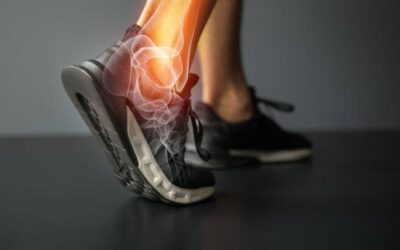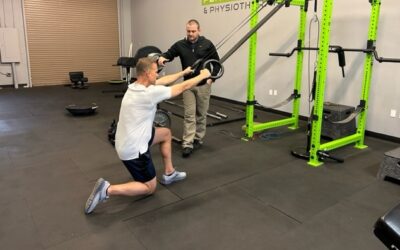I’m sure you’ve heard from someone (your mom, friend, personal trainer, physician, even physical therapist) to avoid a certain exercise because it’s dangerous.
We hear it all of the time!
But, are exercises inherently dangerous?
I’ve heard some of the same exercises mentioned over and over again about being dangerous. So, I did a quick search of all of them and what do you know, conflicting information over the internet!
Dr. Google strikes again, confusing us all.
What is worse is that a lot of these blogs were backed by healthcare providers. Anywhere from physicians, naturopaths, chiropractors, and even physical therapists…
No wonder everyone is running scared. We, the healthcare professionals, are providing false information that has now made a gym culture that these exercises are bad and will injure you.
Here are the top 5 “most dangerous” exercises:

#1: Deadlifts
Coming in at #1 is the dreaded deadlift. Most people believe that deadlifting is bad for you and should be avoided or that deadlifting results in herniated discs and back spasms.
For starters, that’s false.
Most of the verbiage in these blogs is related to performing a deadlift with improper form. Let’s talk about form first. We are all built differently and we all move differently. So your “proper” form is going to be different from mine and that’s okay. Additionally, there are many different ways to perform deadlifts, just like there are many different ways to pick things up off the ground.
Be honest, do you maintain a perfect set up every time you pick up your Amazon package or case of water?
That’s a hard no.
Did you hurt your back? Probably not.
Proper form and mechanics are important, but the body is much more resilient than we give it credit for. If you train a movement (any movement), the body will adapt and tolerate that movement. Picking your kid up off the ground is basically a deadlift, so shouldn’t we load and train the body for the things we do every day?

#2: Good Mornings
On the topic of “weak” and “fragile” spines, let’s talk about good mornings. Good mornings are another exercise commonly listed as being dangerous due to the “risk of injuring your spine”. How many times do I have to say this? Your spine is not a thin, fragile stick that is just going to snap in half.
If you read our Stiff Spine blog, this probably sounds familiar. Stiff things break, like the stick I was just talking about.
Our spine is flexible and bends in many different ways. A good morning is a great way to strengthen the spine and improve our body’s tolerance for certain activities such as gardening, picking up dog poop, pulling weeds, and cleaning the bathtub. Being in a bent-over position is functional. We do it all the time.
This brings me to my next exercise; bent over rows.

#3: Bent Over Rows
Again, how often are you in a bent-over position? Making the bed, cleaning the countertops, playing with your kids and grandkids, or cleaning the floors. There are so many ways to perform a row in general. Adding a bent-over component does not magically make the exercise dangerous.
The exercise isn’t harmful, but if you perform a 150# bent-over row without a bit of training beforehand you may cause yourself a little bit of pain. However, most of us wouldn’t attempt that. I know our ego can get in the way sometimes, but typically we’re not going to go full steam ahead into a new exercise just because we saw some buff dude doing it on Instagram.
Here’s another example, if you’re not a runner, you probably aren’t going to run a marathon without training. It’s all about the gradual introduction of activity and proper loading.

#4: Crunches
Here we go again with the fragile spine and how movement is so bad and we can’t load ourselves and blah, blah, blah.
Your discs are not jelly donuts. They’re not going to start to gush out of your spine. You know this because you’ve probably done a crunch before and you didn’t end up with excruciating back pain.
Here’s an example. Do you see all these gymnasts with insane spine mobility and strength walking around debilitated due to multiple herniated discs? I don’t think so.
Oh and let’s talk about the “cranking” the neck topic. We flex and extend the neck all day long. You look down at your phone, then up at the TV or down at your GPS in your car then up at the road. We move our heads up and down all the time, so why is performing a crunch any different?

#5: Knee extensions
Here’s one I really have a hard time with, especially with my love for treating knee pain, specifically ACL injuries. This myth started with the discussion of biomechanics. Let’s break it down.
The load is placed at the front of the ankle and yes technically when the knee moves into extension (straight position) the tibia (shin bone) is moving forward. So the thought was that because the weight is far away from the knee (longer lever arm) and the shin bone is trying to move forward but the resistance is pushing in the opposite direction, boom! Knee pain!
Well, that’s not really what’s going on.
The other argument is that this movement isn’t “functional”. If I underwent a knee replacement or ACL surgery and my quadriceps muscle is largely atrophied and extremely weak I would say this exercise is pretty important in your recovery.
Restoring normal quad function and strength is huge for these patients. It’s more practical, to begin with, knee extensions and build strength before moving onto something like a squat where you can “cheat” and one leg can do more of the work.
Someone even talked about damaging the delicate cartilage in the knee. Since when did we become such fragile little flowers? The body was meant to work. The body was meant to be loaded. Stop letting these people scare you away from something that is beneficial for your body and health in so many ways.
If you read this far, you’re probably catching onto a theme here. The article is supposed to talk about the most dangerous exercises in the gym. But, those exercises and how ‘dangerous’ they are have been debunked…
Meaning, that there truly is no such thing as a “dangerous” or “bad” exercise…
Well, sort of…
I would rather say that the only “dangerous” or “bad” exercise is the one you are not ready for.
Exercises are based on your goals. You may not need to perform that exercise based on your goals, but that doesn’t make it dangerous or bad for everyone else.
Remember, the body is resilient. It adapts. We are not frail beings. We are STRONG!
If you need help getting strong or debunking some more gym myths, feel free to reach out! We would love the opportunity to help you move better and get back to doing battles in the iron jungle! [email protected]




